International and domestic cooperation
Strengthening Southeast European Studies also means making the study of the region attractive for future generations of students. We put ‘Europe’ at the centre: students will experience an enlarged and still enlarging Europe in the making, following courses offered by us and our partners, and studying together with students from the region.
We will internationalise our teaching, using online teaching platforms that will allow project partners to share their courses. This will create greater choice in the topics students can study. We plan to formalise these online learning imports in Regensburg, in the hope that partner universities will follow. A pilot with the University of Rijeka will start in 2023, which will be rolled out to other partners in the next stage. Our strengths are in the humanities – history, linguistics and social anthropology – while our partner universities may add other relevant subjects in political science, economy, or sociology. Formal teaching agreements could be reached with multiple partner universities (to be shared across the online teaching platform).
We will contribute to an Area Studies extension module for students of all Area Studies programmes on offer in Regensburg, in which conceptual and methodological problems relevant to Area Studies will be analysed. We will coordinate this with the new Department for Interdisciplinary and Multi-scalar Area Studies (DIMAS). The student-led seeFField Blog will offer students the opportunity to develop media and communication skills, making them reflect on the relevance of their acquired knowledge, and instilling in them an ethos of public engagement and knowledge transfer.
From the Summer Term 2023 onwards, we will offer instruction of the Albanian language at beginner and advanced level, adding it to our list of Southeast European languages taught. Although Albanian is on a par with other languages spoken in the region – with six million speakers spread across four Balkan states and 1,5 million living in the diaspora – it is poorly represented in German universities. Apart from being one of the oldest Balkan languages incorporated into the Balkan ‘Sprachbund’, Albanian-inhabited areas of the region are at the centre of numerous global entanglements, providing us with opportunities to explore various translocal and transregional connections. seeFField will reinvigorate ‘Albanian Studies’ – a minor subject in and of itself – as part of Southeast European Studies.
Lecturers from the region
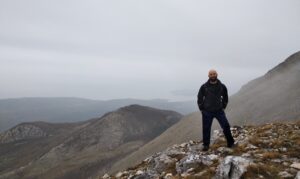
Miloš Đurović, MA
PhD Candidate, Graduate School for East and Southeast European Studies, University of Regensburg
Seminar “Environmental Sustainability: critical perspectives”, summer term 2025, 2026
Miloš Đurović is a doctoral candidate in Social Anthropology at the Graduate School for East and Southeast European Studies at the University of Regensburg. He is a sociocultural anthropologist, ethnologist, and interdisciplinary researcher interested primarily in human-environment relations, urban ecology, energy, body, and human-animal relations. He has taught courses in Anthropology in Montenegro, and as part of the interdisciplinary teams, worked as a researcher on socio-economic and socio-ecological topics in Montenegro and France, including labor market participation, inclusion of vulnerable groups, ethnic minorities, migration, natural commons, sustainability. Miloš has also contributed to projects led by international organizations, such as UN agencies, the World Bank, COST, and the European Commission.
His doctoral research focuses on local experiences of air pollution in the city of Pljevlja, located in northern Montenegro. As part of his research, he organized a fieldwork photo exhibition for the local community he has worked with and studied.
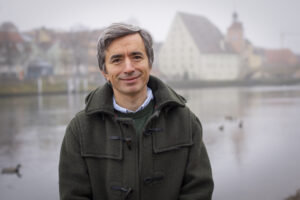
Dr Petru Negură
Associate Professor, and Researcher at the Institute of Legal, Political, and Sociological Research, Moldova State University
Seminar “Everyday Ethnicity and Nation-Building in Eastern and Southeastern Europe: A Bottom-Up Approach”, summer term 2025
Dr Petru Negură is a researcher at the Institute of Legal, Political, and Sociological Research at Moldova State University. He holds a PhD in Sociology from the École des Hautes Études en Sciences Sociales (EHESS) in Paris. From 2020 to 2023, he was a Humboldt Research Fellow at the Leibniz Institute for East and Southeast European Studies (IOS) in Regensburg.
He co-edited the forthcoming volume Nationalism from Below in the East European and Soviet Borderlands: Popular Responses to Nation-Building, 1900–1940 (Bloomsbury), alongside Svetlana Suveica and Andrei Cusco. His research interests include the sociology and social history of intellectuals, education, nation-building, and social welfare in 20th-century Eastern Europe.
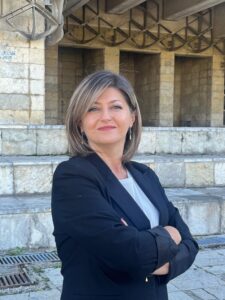
Prof. Asoc. Dr. Blertë Ismajli
Head of the Department for German Language and Literature at University of Prishtina “Hasan Prishtina”
Seminar “Albanisch-deutscher Sprachkontakt mit Berücksichtigung der südslavischen Sprachen”, winter term 2024/25
Blertë Ismajli is a lecturer in German linguistics and German as a foreign language at the Department of German Studies at the University of Prishtina. She was awarded her PhD by the Institute of German Studies at the University of Vienna.
Her research interests include contrastive morpho-syntax, translation of linguistic means for expressing modality, Albanian-German language contact, and the status of the German language in Kosovo as well as its correlation with migration. She has numerous publications and teaching stays at universities in Germany, Czech Republic, Italy, as well as research stays at the Institute of German Studies, University of Vienna. Among other projects, she has translated into Albanian Jürgen Habermas’ “Ein neuer Strukturwandel der Öffenlichkeit und die deliberative Politik”. She currently serves as head of Department, editor-in-chief of the journal “Filologjia” and is a member of the steering board of the National Library of Kosovo.
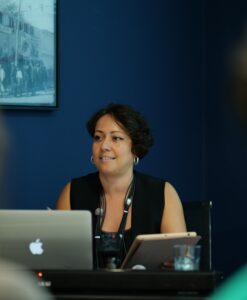
Prof. as. dr. Mikaela Minga
Head of the Folklore Department, Institute of Anthropology – Albanian Academy of Sciences
Seminar “Popular Music, Politics and Society in Southeastern Europe”, winter term 2024/25; winter term 2025/26
Mikaela Minga is an ethnomusicologist and research scholar at the Institute of Anthropology in Tirana. She earned her PhD from the University of Milan (Italy) in 2013. Minga is also a guest lecturer at the University of Arts in Tirana, teaching “Jazz and Popular Music” and “Film Music”.
Her main disciplinary research focuses on urban music practices and popular music in Albania and the Balkan area; music in the dictatorial and post-dictatorial regimes; film music and sound studies, with a particular current focus on sound and audiovisual archives. Among her contributions can be mentioned: Tinguj që rrëfejnë, tinguj që rrëfehen – Elbasani në regjistrimet etnomuzikologjike të arkivit audiovizual – IAKSA, 2020; Spanja Pipa e la canzone urbana di Korça (co-authored with Nicola Scaldaferri, 2015; Aromanian Songs from Drenova (CD album co-edited with Josif Minga), 2018.
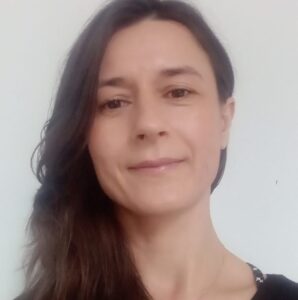
Dr Zora Kostadinova
Teaching Assistant at the School of Slavonic and East European Studies at UCL
Seminar “Islam in Southeastern Europe”, summer term 2024
Dr Zora Kostadinova holds a PhD in Social Anthropology and an MA in Southeast European Studies from University College London. Her dissertation titled “Becoming a Good Person: Islam, the Self and the Ethical Imagination among Naqshbandi Muslims in Postwar Sarajevo” examines the relationship between religious subjectivities, historical temporalities, critical events, and ethics.
Her research interests are in the revitalization of Sufi practices in Southeast Europe, Muslim subjectivities, and intergenerational transmission of Islamic knowledge. She is currently a Teaching Assistant at the School of Slavonic and East European Studies at UCL, and a Research Associate at the École des hautes études en sciences sociales; EHESS on the French Agency funded project, Red Gold.
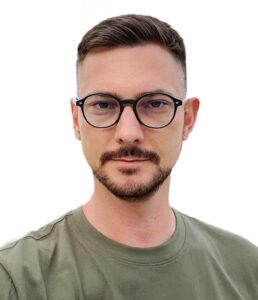
Dr Miroslav Pavlović
Associate professor of Modern history at the University of Novi Sad, Serbia
Seminar “The Balkans under Ottoman rule”, winter term 2023/24
In 2016, he finished his PhD in history under the supervision of Prof. Aleksandar Fotić, with the disertation titled Military Administrative Organization of the Sanjak of Semendire 1739–1788. (formerly known as The Pashalık of Belgrade). Author of two books: Sanjak of Semendire 1739–1788 (2017, in Serbian) and On the Frontier of Islam: The World of an Ottoman European Province in the 18th Century (2023, in Serbian). He received the Ilarion Ruvarac Reward for the best historiographical work in Serbia for 2017.
His main areas of research are history of the Balkans under the Ottoman rule, and Ottoman local elites during transitional period. He has participated in various international scientific projects and university cooperations in Europe and USA. He is a member of various historical associations (European Association for American Studies, etc.), national institutions (Matica srpska), scientific and editorial bords.
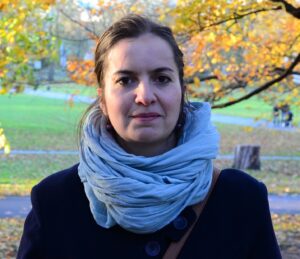
Dr Slavka Karakusheva
Assistant Professor at the Department of Cultural Studies at Sofia University St. Kliment Ohridski
Seminar “Imperial Legacies in the Balkans”, winter term 2023/24
Slavka Karakusheva has earned her PhD in Cultural Anthropology from the Sofia University St. Kliment Ohridski. She was recently awarded a postdoctoral fellowship at the Centre for Advanced Studies in Sofia (2022-2023). Slavka has specialized at esteemed institutions including the British Institute at Ankara (2023), The Centre for Southeast European Studies at the University of Graz (2019), The Department of New Media at Kadir Has University (2016), and The Cultural Politics and Management Research Centre at Istanbul Bilgi University (2014-2015), among others.
Her research spans various collective projects exploring themes such as gender policies towards Muslim minorities in Eastern Europe, Ottoman heritage with a focus on public bathhouses, and migration practices in the Balkans. Her current academic pursuits delve into nation-building politics, migration dynamics, and identity construction within Bulgaria’s Turkish and Muslim communities, as well as minority cultural memory and heritage.
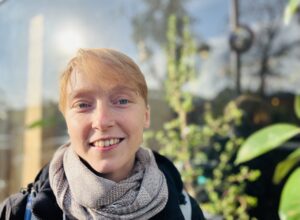
Vita Zelenska
PhD candidate at the Leibniz ScienceCampus Regensburg
Seminar “Critical Migration Studies”, summer term 2023
Vita Zelenska is an anthropologist, curator, and artist working in political anthropology, anthropology of sound, anthropology of art, and sound studies. At the moment they are a doctoral candidate at the Leibniz ScienceCampus Regensburg. They are writing about knowledge production/knowledge making around the topic of migration in Greece and the USA, including sonic knowledge. Their latest publications are available here:
Articles on the topic
Das Croaticum an der Universität Regensburg: Kroatische Sprache, Identität und Mehrsprachigkeit
The Croatian language in Regensburg is present not only as a subject of study but also as an important part of the linguistic and cultural identity of the local community. At the University of Regensburg, the Croaticum – Center for Croatian Language and Culture – offers Croatian language courses to students of various degree programs, as well as to students from Croatian families who wish to reestablish or deepen their connection with their heritage language
read articleWhat is the editorial team thinking about this month?
Was bedeutet Sprache für unser Editorial-Team? Elina spricht Russisch, Englisch und Deutsch; Antonia spricht Rumänisch, Ungarisch, Englisch und Deutsch; Iman spricht Albanisch, Englisch, Türkisch und Deutsch und versteht BKMS. Auf diesem Blog werdet ihr die Perspektiven unseres Teams kennenlernen: Wie sehen wir Sprache und was bedeutet sie für unsere Identität? Von Elina, die auf den Straßen Deutschlands mit russischer Musik ihre Zugehörigkeit findet, über Antonias bilinguales Aufwachsen bis hin zu Imans Fragen zur Sprache und dazu, was sie an sich bedeutet. Was sich sagen lässt: Sprache ist eine sehr persönliche Angelegenheit. Das Thema des Monats Februar ist Language and Identity.
read articleDer EU-Beitritt Rumäniens unter besonderen Auflagen. Aus der Perspektive der Europäischen Kommission
Die Frage, warum Rumänien trotz seiner demokratischen Mängel der Europäischen Union beitrat, kann durch den gezielten Einfluss der Europäischen Kommission begründet werden. Aus den Monitoringberichten und den Interwiew der ehemaligen Kommissionsmitglieder geht hervor, dass sie sich der Defizite bewusst waren und diese mit geopolitischen Überlegungen abwägten.
read articleWhat is the editorial team thinking about this month?
Rückblickend haben wir wirklich allen Grund, stolz auf das zu sein, was wir in diesem Jahr erreicht haben. Das Jahr 2025 hat uns wertvolle Erfahrungen, neue Erkenntnisse und ein tieferes Verständnis dafür gebracht, wofür seeFField steht und warum unsere Arbeit wichtig ist.
read articleWhat is the editorial team thinking about this month?
Rückblickend haben wir wirklich allen Grund, stolz auf das zu sein, was wir in diesem Jahr erreicht haben. Das Jahr 2025 hat uns wertvolle Erfahrungen, neue Erkenntnisse und ein tieferes Verständnis dafür gebracht, wofür seeFField steht und warum unsere Arbeit wichtig ist.
read articleConfronting Femicide in Romania
So far this year, in Romania, 57 women have been killed as a result of intentional, gender-motivated violence. This blog argues that such cases are not isolated incidents but symptoms of deeper structural problems: institutional negligence, misogynistic and patriarchal societal norms, and a lack of effective preventive mechanisms and institutions.
read articleProteste sind weiblich? Ein Jahr studentischer Proteste in Serbien zwischen Novi Pazar und Novi Sad
Besonders interessant ist die bislang kaum untersuchte Frage der Genderrollen: Wie wirken sich Proteste in einem autoritären, patriarchalen System aus, wenn sie von einer Gruppe getragen werden, in der laut UNESCO 32 % mehr Frauen als Männer studieren?
read articleWhat is the editorial team thinking about this month?
Das Thema des Monats November ist das Leben ausländischer Frauen in Deutschland. Wir sprechen über unsere Herausforderungen und über die Chancen, die wir alle nutzen können.
read articleDiella. Die KI-Ministerin, die ihre künstlichen Blumen gießt?
Ist Diella ein revolutionärer Fortschritt für Albanien – oder nur eine PR-Show in einem Land, das mit tief verwurzelten Problemen kämpft?
read articleKI im Studium und Wissenschaftskommunikation: Fluch oder Segen? – Ein Erfahrungsbericht des Editorial Teams
In diesem Bericht sollen individuelle Perspektiven auf diese Entwicklung gesammelt werden, um Vor- und Nachteile der KI-Nutzung in verschiedenen Bereichen aufzuzeigen. Ziel ist es, die Erfahrungen im Studium, im beruflichen Kontext und im privaten Alltag zu erfassen und kritisch zu reflektieren.
read articleWhat is the editorial team thinking about this month?
Das Thema des Monats Oktober ist Künstliche Intelligenz und wie wir sie in unserer Arbeit und im Studium einsetzen. Doch bevor wir tiefer einsteigen, werfen wir zunächst einen Blick darauf, womit sich unser Team aktuell beschäftigt.
read articleThrakien in der Geopolitik
Im griechischen Teil Thrakiens sticht die geopolitische Relevanz der Region besonders ins Auge. Bereits kurz vor den Toren unserer ersten Station Alexandroupolis passierte unser Reisebus eine große Kaserne des griechischen Militärs. Die Gründe für die hohe Militärpräsenz in der Stadt und Umgebung ergeben sich einerseits aus der Grenznähe zur Türkei und andererseits aus dem für die NATO strategisch wichtigen Hafen.
read articleReclaiming public space: Feminist history (re) writing of Southeast Europe
Public space in Southeast Europe reflects deeply entrenched gendered and geopolitical hierarchies, where patriarchal and nationalist narratives dominate memory and shape urban landscapes. Women, queer communities, and minorities are largely excluded from public commemoration. However, feminist artists, activists, and grassroots movements are resisting this erasure through creative interventions such as performance, street art and activist cartography.
read article(Not) to sit in an ivory tower with a nice balcony: Highlights from the 2nd Southeast European Studies Forum (Prishtina, 19-22 March 2025)
From March 19 to 22, partners from our network met at the University of Prishtina to discuss some key issues affecting Area Studies: How can academia continue to fulfil its public mission by adapting to new media? How do we preserve linguistic diversity in the age of AI?
read articleKako je borba protiv korupcije postala borba protiv obrazovnog sistema ? — Hronologija pritisaka
At the end of 2024, tragedy shook Serbia - 16 people lost their lives due to the fall of a canopy at the newly renovated railway station in Novi Sad, once again drawing attention to the state's negligence for its own citizens and the consequences of galloping corruption. The grief quickly turned into one of the largest civil uprisings in Serbia's recent history.
read article2025 Southeast European Student Symposium- Third Edition
The Southeast European Studies (SEES) Student Symposium was initiated by students from the universities of Graz, Regensburg, and Jena. The main goal of the symposium is to provide an opportunity for networking among students and graduates who are interested in Southeast European Studies.
read articleMasakra e Tivarit: Kujtesa, Trauma dhe Trashëgimia e Pazgjidhur e Luftës së Dytë Botërore në Ballkan
Masakra e Tivarit ishte një ngjarje tragjike gjatë muajve të fundit të Luftës së Dytë Botërore, kur Partizanët Jugosllavë detyruan mijëra burra shqiptarë nga Kosova të marshonin drejt Tivarit (Bar, Mali i Zi), me pretekstin e rekrutimit ushtarak. Pasi mbërritën, shumë prej tyre u ekzekutuan në vrasje masive.
read articleSerbia on the move. Reflections on the student protests.
Two taxi drivers, two worlds—yet one powerful student movement calling out corruption across Serbia. Fed up with broken promises and a collapsed train station canopy, these young activists want transparency, justice, and better universities. Ready to discover how they’re uniting a divided society?
read article„Ich bin eine wirklich stolze bayerische Kroatin“ – Die Sprachbiographie der mehrsprachigen bayerischen Landwirtschaftsministerin Michaela Kaniber
Der Artikel untersucht die Sprachbiographie von Michaela Kaniber, der Bayerischen Staatsministerin für Ernährung, Landwirtschaft, Forsten und Tourismus. Die Studie basiert auf einem Interview, das im November 2023 geführt wurde.
read articleZwischen Küste, Gastfreundschaft und Aufbruch: Eine Exkursion ins Herz Albaniens
Wie sieht die Zukunft eines Landes aus, das jahrzehntelang isoliert war und nun zum aufstrebenden Geheimtipp für Reisende avanciert? Erleben Sie in diesem Beitrag, wie sich Albanien vom einst isolierten Land zu einem aufstrebenden Reiseziel wandelt.
read articleIstorija države kao istorija svih njenih naroda
Ko ima pravo da ispriča istoriju? Ako kolektivno sećanje predstavlja zajedničku, često institucionalizovanu prošlost, negovanu u okvirima određene društvene grupe, šta se, onda, događa sa prošlošću onih čiji glasovi nisu deo tog kolektivnog narativa, koji se sa njim ne poistovećuju i koji mu se – čak – protive?
read articleWie schimpft der Balkan? Ein wissenschaftlicher Blick ins Wörter-Schmutzwäschefach
Laut einigen Studien gehören etwa 80 Wörter, die Erwachsene täglich verwenden, zur Kategorie der Tabuwörter, darunter auch Schimpfwörter. Schimpfwörter sind nicht nur bloße sprachliche Äußerungen mit spezifischer Wirkung,sondern ein äußerst ergiebiges Forschungsthema, und zwar interdisziplinär. In diesem Text wollen wir auf einige Aspekte dieses Forschungsgegenstandes aufmerksam machen.
read articleOn the Possibility of an Anthropology of a State that Does Not Yet Exist
This essay tries to make (anthropological) sense of a new and remarkable proposal that the Prime Minister of Albania, Edi Rama, came up with recently: to create a new sovereign religious statelet within Albania. How can we anthropologically interpret the emergence of this initiative and the changes it underwent over time, perhaps even leading to it being stalled without ever being implemented?
read articleSrebrenica (never) again? Responding to the Bavarian Action Plan against Antisemitism
Srebrenica mahnt – doch manche deutsche Politiker vergessen. Markus Söder schüttelt die Hand von Vučić, der den Genozid leugnet, während Bayern selbst Kritiker mundtot macht und Studierende exmatrikulieren will. Was ist „Nie wieder“ noch wert, wenn es nur eine politische Waffe ist?
read articleItalien und Albanien: Ein umstrittenes Modell zur Migrationspolitik
In den letzten Jahren hat sich die europäische Migrationspolitik zu einem hochumstrittenen Thema entwickelt, das nicht nur die Mitgliedsstaaten der Europäischen Union (EU), sondern auch Drittstaaten in den politischen und moralischen Fokus rückt. Die italienische Regierung unter Ministerpräsidentin Giorgia Meloni verfolgt dabei einen besonders provokanten Ansatz: Asylverfahren sollen erstmals außerhalb der EU abgewickelt werden – in Lagern in Albanien.
read articleConference Report: “Albanian Studies Symposium: Exploring the Future of Interdisciplinary Research“
Albania is currently undergoing a dynamic development and is high on Germany's foreign policy agenda. The international symposium aimed to discuss new perspectives on Albanian Studies at the University of Regensburg (UR) and beyond. We wanted to explore new perspectives for Albanian studies. In the field of linguistics, current issues of multilingualism, language policy and public discourse were discussed. Albanian is an important language of origin in Germany. In the area of literature and culture, we talked about Albanian literature under totalitarianism and transnational literature, based on Albanian authors in migration who write in foreign languages
read articleVon Bukarest nach Regensburg: Die unbekannte Geschichte unserer Uni-Gebäude
Nicht nur auf der Baustelle arbeiteten die rumänischen Arbeiter Hand in Hand mit ihren deutschen Kollegen. Auch abseits des Arbeitsalltags suchten sie nach Möglichkeiten, sich in die Regensburger Gemeinschaft zu integrieren. Eine Leidenschaft verband sie dabei besonders: der Fußball.
read articleCroatia’s “Mercedes” Town: How Imotski Honours its Gastarbeiter Heritage
At the beginning of June, Croatian and German flags flew over Imotski, a town in southern Croatia, as citizens gathered for a two-day celebration. They celebrated the unveiling of the “Mercedes” monument, a life-size replica of the Mercedes 115, popularly known as “Minika”.
read articleHow to do EUrope with words in the Western Balkans
Politics can be regarded as the art of words. Words not only express views and values but also reveal potential and planned activities and incite specific actions. Discourses about EUrope are particularly revealing in that regard, not only at election time.
read articleBulgarian Cartrader
Daniel Stoyanov, aka Bulgarian Cartrader, is a rising star on the indiepop scene in Germany. Born in Bulgaria in 1986, he grew up in Germany since he was four. The text provides insights into his two key passions, music and cars. Following in his father's footsteps, he developed a liking for cars when he was young. As for his music, Bulgarian Cartrader has an exceptional talent for combining contemporary genres. His texts are autobiographical, reflecting, amongst other things, on his Bulgarian roots. Ger Duijzings has been intrigued by his alter-ego, exploring Daniel's life and music.
read article2024 Southeast European Student Symposium – Second Edition
The Southeast European Studies (SEES) Student Symposium originated as an initiative by students from the universities of Graz, Jena and Regensburg. The overarching aim of the Symposium is to provide an opportunity for networking among undergraduate and graduate students who have a subject-related connection to Southeast Europe.
read articleEin heißer Herbst auf dem Balkan. Eindrücke aus Prishtina und Skopje im Oktober 2023
Als Fellow kann man seinen Dienstort eine Zeit lang gegen einen Ort im Ausland eintauschen. Im Idealfall dient dies nicht allein der Materialsuche, sondern auch der besseren Vernetzung mit Kolleginnen und Kollegen aus der Region und allemal der Erweiterung des persönlichen Horizonts. In meinem Fall standen Prishtina und Skopje auf dem Reiseplan, zwei Hauptstädte Südosteuropas, die ich aufgrund von Archivrecherchen aufsuchte.
read articleDie Jugend der Stadt Mostar in der Nachkriegszeit
Die Brücke „Stari Most“, ein Wahrzeichen der Stadt Mostar aus der osmanischen Zeit, die sich über dem Neretva-Fluss in Bosnien und Herzegowina befindet, verbindet die zwei Stadtteile miteinander. Die Brücke wurde im Laufe des Kroatisch-Bosniakischen Kriegs zerstört. Seit dem Wiederaufbau im Jahre 2004 wird sie gerne als Symbol für die Versöhnung der Gesellschaft präsentiert.
read articleQualitative Südosteuropa-Forschung mithilfe sozialer Medien
Soziale Medien sind als Quelle für Nachrichten, Unterhaltung und Kommunikation allgegenwärtig. Mittlerweile gehören sie auch in der Wissenschaft zum Alltag dazu. Während sie in erster Linie als Plattform zur Verbreitung von Forschungsergebnissen betrachtet werden, bieten sie sich zugleich als vielseitige Datenquellen und interessanten Forschungsgegenstand an.
read articleAuf den Spuren der extremen Rechten und ihrer semiotischen Gegenwärtigkeit im Bukarester Stadtbild
Sprache beziehungsweise Kommunikation ist ein entscheidendes Mittel der Politik. So ist sie selbstverständlich geprägt durch Wettbewerb und die Konfrontation verschiedener Meinungen. In der Öffentlichkeit ist diese Konkurrenz stets zu erkennen, wie etwa in Talkshows, aber auch in Form von Vandalismus im Stadtbild. Über 10 Tage habe ich eigenhändig nationalistische Zeichen in Form von Graffitis, Stickern, Flaggen und Werbeplakaten beobachtet und in Verbindung mit ähnlichem Forschungsstand gebracht.
read articleDas „Hässliche“ im „Balkan“
Wenn man sich mit dem Begriff des „Hässlichen“ auseinandersetzt, bietet es sich an, zunächst das Konzept des „Schönen“ und die Ästhetik zu betrachten. Immanuel Kant, einer der Urväter...
read articleCroatia’s branitelji: Between heroism and oblivion
Having claimed more than 22,000 casualties, the memory of the Homeland War still looms large in the social and political landscape almost 25 years later. One issue of particular concern has to do with the branitelji, or ‘defenders’ – those citizens who are officially recognised as having fought for the Croatian armed forces in that conflict.
read articleInsights into the Upcoming Serbian Elections
As the upcoming general elections in Serbia takes center in the political stage, approximately 6.5 million voters are poised to make their voices heard on the 17th of December, marking yet another chapter in the nation's electoral history.
read article„Links“, „rechts“ und so weiter: Wie wenig unsere Begrifflichkeiten im globalen Vergleich weiterhelfen
Globale Verständigung ist ein Kunststück – vor allem dann, wenn Wörter zwar gleich aussehen, aber in jeder Region ihre eigene Bedeutung haben. So meinen die politischen Begriffe Rechts und Links in Lateinamerika nicht dasselbe wie in Südosteuropa. Die Missverständnisse, die sich daraus ergeben, haben historische Ursachen, die bis in die Kolonialzeit zurückgehen...
read articleThe Genocide of Roma in Hungary: Romani women as agents of resistance
In contrast to the persecution of Jews during the Second World War, that of Roma was not as well-organised and prepared, nor as systematic. Rather, while Roma faced constant discrimination, their erasure...
read articleReady to sail out… Reflections on the first Southeast European Studies Forum (Regensburg, 28-30 April 2023)
While in recent years, Southeast European Studies has become more sophisticated due to conceptual restructuring, it is important to acknowledge that many significant challenges lay ahead of us. Some of these were discussed during the first Southeast European Studies Forum...
read articleWhat plastics can do in Romania
In Romania, plastic waste is highly visible and engenders various reactions, from indifference to debate and action. In April 2021, Mara (woman, cultural journalist, mid-thirties), posted on Facebook a photo ...
read articleDer Westen und der Balkan. Eine Entflechtung.
Ein Schrottauto fährt los auf einer holprigen Straße in den Bergen und gleich läuft dem Fahrer auch noch ein Esel entgegen. Dazu Musik von Blechbläsern und feurige Rhythmen...
read articleLessons from the Past? Corruption in Wallachia during the Eighteenth Century and Beyond*
Historians of corruption claim that, although direct lessons cannot be derived from the past, the phenomenon of corruption can be better understood if we study it historically. On the one hand, today's activities regarded as corrupt were not specific to countries seen as corrupt. On the other hand, successful anticorruption is a historical, protracted process determined by a multitude of factors in a particular historical configuration.
read articlePovijest i značaj dana Frankofonije u Osijeku
Organizacije poput Francuske alijanse Osijek i Cercle francais d'Osijek doprinijele su promicanju francuskog jezika i kulture, te su postale važna mjesta za okupljanje francuskih državljana i lokalnog stanovništva zainteresiranog za francuski jezik i kulturu.
read articleFrom Post-Conflict Stability to Post-Conflict Degradation: The Consequences of the European Union’s Liberal Peacebuilding Approach in Kosovo
Since the Kosovo War ended on June 10th, 1999, the international community has allocated an extensive amount of official development assistance (ODA) to transform Kosovo from a territory with minimal critical infrastructure into...
read articleKasëm Trebeshina und der sozialistische (Sur)Realismus
Kasëm Trebeshina war ein albanischer Autor, Dissident und politischer Gegner von Enver Hoxha. Trotz seines eigenen kommunistischen Hintergrundes hatte er ein Problem mit der nationalen Zensurpolitik unter dem kommunistischen Regime und schrieb ein Memorandum an Hoxha, für das er verhaftet...
read articleThe Political Situation in Romania – Between Political Cliques, Power struggles, and Corruption
Romania. The country, which has been a member of the European Union since 2007, usually receives little attention in the western media. However, since the start of the Russian war of aggression against Ukraine...
read articleReady for the Homeland and the Battle of Meanings
Memory wars in Croatia are often triggered by the presence of the World War Two „Ready for the Homeland“ (Za dom spremni) Ustaša salute, from its use by right-wing politicians and war veterans...
read articleSoutheast European Student Symposium 2023
The Southeast European Studies (SEES) Student Symposium originated as an initiative by students from the universities of Graz, Jena and Regensburg. It aimed at providing an opportunity for networking among SEES students...
read articleAteizmi ideologjik në Shqipërinë totalitare dhe zbatimi i tij
Ky punim është pjesë e monografisë sime “Censura e letërsisë së përkthyer në Shqipërinë totalitare: rasti Robinson Kruzo”,...
read articleDie Frau im Hintergrund:
Als Ehefrau des albanischen Diktators Enver Hoxha bleibt Nexhmije Hoxha in der Forschung häufig unbeachtet. Dennoch verfügte sie über eine einflussreiche Stellung...
read articleRat se opet vratio
Rat u Ukrajini probudio je sjećanja na ratove u bivšoj Jugoslaviji; i u meni, jer sam bio u Jugoslaviji kad su počeli ratovi. U ožujku 2022., samo dvanaest dana nakon početka ruske invazije, primio sam telefonski poziv od Pavla, starog prijatelja iz davnih dana, kao da se duh iz prošlosti vratio da mi kaže: “Bok, rat se opet vratio!"...
read articleArtist Milica Tomić and the (Im)possibility of Building a Memorial
In November 2002, the city of Belgrade announced a sculptural design competition for a memorial dedicated to the ‘fallen fighters and victims’ of the Yugoslav wars during the 1990s. In response to this, a group of artists...
read articleSanja Iveković und das Bild der Frau
Sanja Iveković ist eine Künstlerin die seit den 70ern für ihre - damals wie heute - neuartige und provokante Kunst bekannt ist: Neuartig im Einsatz verschiedenster Medien und provokant vor allem durch ihre Themen. Sie polarisierte weltweit mit Werken zu...
read articleThe future of corruption studies
The fight against corruption ‘adorns’, as we know, the project of European integration. But in the current context of multiple crises, it may lose some of its urgency, especially when corruption helps to ‘save the day’...
read article„Eine SMS und weg war ich!“
Zwischen 2018 und 2020 wurde eine Gruppe von sechs rumänischen Bauarbeitern aus der Region Botoșani, sowie ihre Angehörigen, im Rahmen einer Masterarbeit über mehrere Monate bei ihrem Versuch...
read articleStirbt das Kyrillische in Serbien aus?
Westliche Musik und Kultur, soziale Medien und amerikanische Filme – die serbische Jugend scheint der kyrillischen Schrift den Rücken gekehrt zu haben. Möchte man den Schlagzeilen der serbischen Boulevardpresse...
read articleThe Belgrade Waterfront: Creation of the city of the future?
During the summer term 2022, students of the University of Regensburg had the opportunity to take part in a week- long excursion to Serbia. They visited the capital...
read articleSerbiens Titelseiten – Abbilder umkämpfter Pressefreiheit
Pressefreiheit gilt als einer der zentralen Indikatoren für eine demokratische Gesellschaft. Aus gutem Grund, unabhängige Berichterstattung über...
read articleStraßenschlachten mit Aerosol
Die Stadt Belgrad ist bunt. Es liegt der Geruch von Farbe in der Luft und selbst dem ungeschulten Auge wird schnell deutlich, dass es kaum eine Hauswand gibt, die in ihrem Originalzustand belassen wurde...
read article